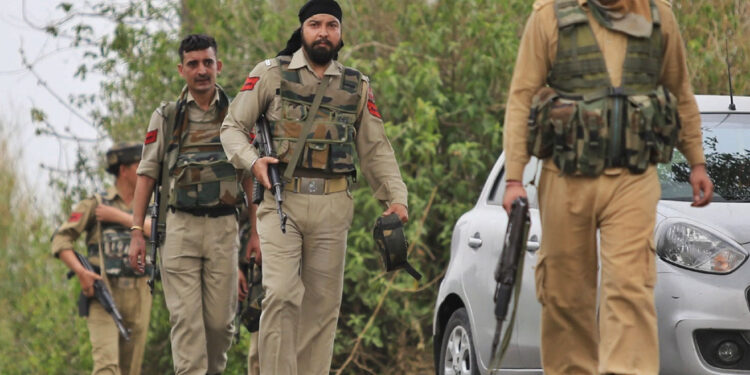
Explosion at the Nowgam Police Station: A devastating explosion at the Nowgam Police Station near Srinagar on Friday night claimed at least nine lives and left 29 others injured. The blast occurred when a large quantity of explosive material—recently seized from Faridabad in connection with an ongoing terror investigation—detonated while being examined by police officials and forensic experts.
According to senior police authorities, most of the deceased were personnel from the Jammu and Kashmir Police and members of the forensic team who were analyzing the confiscated material. Two officials from the Srinagar administration were also killed in the tragic incident. The explosion shook the surrounding area, severely damaging the police station building and triggering immediate emergency response.
Authorities confirmed that the injured were rushed to the Indian Army’s 92 Base Hospital and the Sher-i-Kashmir Institute of Medical Sciences (SKIMS). Emergency medical teams have been deployed, and the area around the police station has been fully cordoned off while investigation teams assess the damage and collect evidence.
The explosives had been recovered days earlier during a coordinated raid conducted by Jammu and Kashmir Police and Haryana Police. The raid targeted the residences and hideouts of individuals linked to a radicalised terror module involving highly educated professionals—specifically doctors—associated with a growing “white-collar terror ecosystem.”
Terror Module Crackdown Led to Massive Explosive Recovery
The Nowgam Police Station had earlier cracked a critical case involving posters circulated by the banned terror organisation Jaish-e-Mohammed (JeM). The posters, which appeared at several locations, warned of large-scale attacks on security forces and civilians. CCTV footage from the incident led investigators to Adeel Ahmad Rather, a doctor formerly associated with the Government Medical College in Anantnag and later employed in Saharanpur, Uttar Pradesh.
Rather’s arrest opened the lid on a sophisticated terror network of radicalised professionals reportedly operating under the guidance of foreign handlers based in Pakistan and other countries. From his possession, police recovered an assault rifle and several incriminating documents.
During interrogation, Rather revealed the involvement of another doctor, Muzammil Shakeel, who worked at Al-Falah Medical College in Faridabad, Haryana. A subsequent raid by the joint J&K–Haryana team resulted in the recovery of nearly 3,000 kg of ammonium nitrate, a key component used in improvised explosive devices (IEDs). This extraordinary quantity of explosive chemical indicated the scale of planned terror operations.
Shakeel’s arrest, in turn, led to further revelations and the apprehension of another doctor, Shaheen Saeed, from the same medical college. The suspected network was believed to have been plotting multiple high-impact attacks across major Indian cities.
Link to Delhi Blast and Escalating Investigations
The Faridabad recovery became even more significant after a deadly car explosion near the Red Fort in Delhi earlier this week, killing 13 people and injuring more than 20. Investigators later revealed that Umar Nabi—another doctor whose name surfaced during the probe—was allegedly driving the vehicle involved in the blast. Sources from the National Investigation Agency suggested that the suspect may have improperly assembled the IED, preventing it from causing even more catastrophic damage.
The seizure of ammonium nitrate and other materials might have triggered panic among module members, pushing them into hasty decisions and movements. The ongoing investigation suggests a broader, carefully organized terror network aiming to execute large-scale attacks across multiple states.
Nowgam Blast Raises Concerns Over Safe Handling of Seized Explosives
The tragic explosion at Nowgam has also sparked serious questions regarding the storage and handling of confiscated explosive materials. The blast occurred while trained officials were inspecting the seized stockpile, but the sudden detonation has prompted calls for stricter protocols and enhanced safety precautions.
Senior officers at the scene have confirmed that an inquiry has been launched to determine whether the seized material was stored and handled according to standard safety guidelines.
As security forces continue to dismantle the terror ecosystem involving radicalised professionals, the Nowgam incident stands as a reminder of the deadly risks faced daily by police and investigation teams. The blast has further intensified the urgency of the ongoing probe into the Faridabad terror module and its nationwide links.














